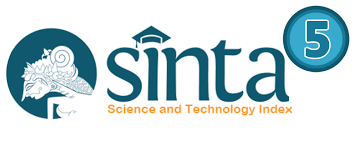Hubungan Kepemimpinan Bertanggung Jawab Terhadap Turnover Intention Pada Karyawan Bank Swasta Di Jakarta: Peran Mediasi Iklim Etis
Abstract
Tujuan dari penelitian ini adalah untuk mengetahui sejauh mana iklim etis memediasi antara kepemimpinan yang bertanggung jawab dan niat pergantian karyawan (keluar karyawan). Teknik convenience sampling digunakan untuk mengumpulkan data dari karyawan tingkat cabang Bank swasta di Jakarta. Pendekatan analisis deskriptif dan structural equation modelling (SEM) digunakan menggunakan SPSS 22.0 dan Smart PLS 3.0. Berdasarkan hasil penelitian diketahui bahwa kepemimpinan bertanggung jawab berpengaruh signifikan terhadap iklim etis. Iklim etis berpengaruh negatif dan signifikan terhadap niat keluar karyawan. Iklim etis memediasi hubungan antara kepemimpinan yang bertanggung jawab dan niat untuk keluar (intensi keluar) karyawan.
References
Antunes, A., & Franco, M. (2016). How people in organizations make sense of responsible leadership practices: Multiple case studies. Leadership and Organization Development Journal, 37(1), 126–152. https://doi.org/10.1108/LODJ-04-2014-0084
Christian, J. S., & Ellis, A. P. J. (2014). The Crucial Role of Turnover Intentions in Transforming Moral Disengagement Into Deviant Behavior at Work. Journal of Business Ethics, 119(2), 193–208. https://doi.org/10.1007/s10551-013-1631-4
Cole, M. S., & Bruch, H. (2006). Organizational identity strength, identification, and commitment and their relationships to turnover intention: does organizational hierarchy matter? Journal of Organizational Behavior, 27, 585–605. https://doi.org/10.1002/job.378
Demirtas, O., & Akdogan, A. A. (2015). The Effect of Ethical Leadership Behavior on Ethical Climate, Turnover Intention, and Affective Commitment. Journal of Business Ethics, 130(1), 59–67. https://doi.org/10.1007/s10551-014-2196-6
Doh, J. P., Stumpf, S. A., & Tymon, W. G. (2012). Responsible leadership helps retain talent in India. Responsible Leadership, 85–100. https://doi.org/10.1007/s10551-011-1018-3
Fernando, M. (2016). Leading responsibly in the Asian century. Leading Responsibly in the Asian Century. https://doi.org/10.1007/978-3-319-21789-5
Geisser, S. (1974). A predictive approach to the random effect model. Biometrika, 61(1), 101–107. https://doi.org/10.1093/biomet/61.1.101
Hair, Joe F., Ringle, C. M., & Sarstedt, M. (2011). PLS-SEM: Indeed a silver bullet. Journal of Marketing Theory and Practice, 19(2), 139–152. https://doi.org/10.2753/MTP1069-6679190202
Hair, Joe F., Sarstedt, M., Hopkins, L., & Kuppelwieser, V. G. (2014). Partial least squares structural equation modeling (PLS-SEM): An emerging tool in business research. European Business Review, 26(2), 106–121. https://doi.org/10.1108/EBR-10-2013-0128
Hair, Joseph F., Sarstedt, M., & Ringle, C. M. (2019). Rethinking some of the rethinking of partial least squares. European Journal of Marketing, 53(4), 566–584. https://doi.org/10.1108/EJM-10-2018-0665
Haque, A., Aydin, E., & Uysal, E. (2017). A comparison of effectiveness of global leaders and domestic leaders in electronic retail industry. Global Journal of Management and Business Research: G Interdisciplinary, 17(3), 1–16.
Haque, Amlan, Fernando, M., & Caputi, P. (2019). The Relationship Between Responsible Leadership and Organisational Commitment and the Mediating Effect of Employee Turnover Intentions: An Empirical Study with Australian Employees. Journal of Business Ethics, 156(3), 759–774. https://doi.org/10.1007/s10551-017-3575-6
Henseler, J., Ringle, C. M., & Sarstedt, M. (2015). A new criterion for assessing discriminant validity in variance-based structural equation modeling. Journal of the Academy of Marketing Science, 43(1), 115–135. https://doi.org/10.1007/s11747-014-0403-8
Jamali, D., Safieddine, A. M., & Rabbath, M. (2008). Corporate governance and corporate social responsibility synergies and interrelationships. Corporate Governance: An International Review, 16(5), 443–459. https://doi.org/10.1111/j.1467-8683.2008.00702.x
Lee, D.-C., Hung, L.-M., & Chen, M.-L. (2012). Empirical Study on the Influence among Corporate Sponsorship, Organizational Commitment, Organizational Cohesiveness and Turnover Intention. Journal of Management and Sustainability, 2(2), 43–53. https://doi.org/10.5539/jms.v2n2p43
Maak, T., & Pless, N. M. (2006). Responsible leadership in a stakeholder society - A relational perspective. Journal of Business Ethics, 66(1), 99–115. https://doi.org/10.1007/s10551-006-9047-z
Mendonca, M. (2001). Preparing for ethical leadership in organizations. Canadian Journal of Administrative Sciences, 18(4), 266–276. https://doi.org/10.1111/j.1936-4490.2001.tb00262.x
Miska, C., & Mendenhall, M. E. (2018). Responsible Leadership: A Mapping of Extant Research and Future Directions. Journal of Business Ethics, 148(1), 117–134. https://doi.org/10.1007/s10551-015-2999-0
Neubert, M. J., Carlson, D. S., Kacmar, K. M., Roberts, J. A., & Chonko, L. B. (2009). The virtuous influence of ethical leadership behavior: Evidence from the field. Journal of Business Ethics, 90(2), 157–170. https://doi.org/10.1007/s10551-009-0037-9
Ötken, A. B., & Cenkci, T. (2012). The Impact of Paternalistic Leadership on Ethical Climate: The Moderating Role of Trust in Leader. Journal of Business Ethics, 108(4), 525–536. https://doi.org/10.1007/s10551-011-1108-2
Pless, N., & Maak, T. (2009). Responsible leaders as agents of world benefit: Learnings from “project ulysses.” Journal of Business Ethics, 85(1), 59–71. https://doi.org/10.1007/s10551-008-9947-1
Podsakoff, P. M., MacKenzie, S. B., Lee, J. Y., & Podsakoff, N. P. (2003). Common Method Biases in Behavioral Research: A Critical Review of the Literature and Recommended Remedies. Journal of Applied Psychology, 88(5), 879–903. https://doi.org/10.1037/0021-9010.88.5.879
Raja, U., Johns, G., & Ntalianis, F. (2004). The impact of personality on psychological contracts. Academy of Management Journal, 47(3), 350–367. https://doi.org/10.2307/20159586
Schluter, J., Winch, S., Holzhauser, K., & Henderson, A. (2008). Nurses’ moral sensitivity and hospital ethical climate: a literature review. Nurs Ethics, 15(3), 304–321. https://doi.org/10.1177/0969733007088357
Schwartz, M. S., & Carroll, A. B. (2003). Corporate social responsibility: a three-domain approach. Business Ethics Quarterly, 13(4), 503–530. https://doi.org/10.2307/3857969
Schwepker, C. H. (2001). Ethical climate’s relationship to job satisfaction, organizational commitment, and turnover intention in the salesforce. Journal of Business Research, 54, 39–52. https://doi.org/10.1016/S0148-2963(00)00125-9
Stewart, R. W. (2011). You Support Diversity, But Are You Ethical? Examining the Interactive Effects of Diversity and Ethical Climate Perceptions on Turnover Intentions. Journal of Business Ethics, 99(3), 453–465. https://doi.org/10.1007/s10551-010-0663-2
Voegtlin, C. (2012). Development of a scale measuring discursive responsible leadership. Responsible Leadership, 57–73. https://doi.org/10.1007/s10551-011-1020-9
Waldman, D. A., & Galvin, B. M. (2008). Alternative Perspectives of Responsible Leadership. Organizational Dynamics, 37(4), 327–341. https://doi.org/10.1016/j.orgdyn.2008.07.001
Wright, T. A., & Goodstein, J. (2007). Character is not dead in management research: A review of individual character and organizational-level virtue. Journal of Management, 33(6), 928–958. https://doi.org/10.1177/0149206307307644
Yasin, R., Namoco, S. O., Jauhar, J., Abdul Rahim, N. F., & Zia, N. U. (2020). Responsible leadership an obstacle for turnover intention. Social Responsibility Journal, (March). https://doi.org/10.1108/SRJ-03-2020-0092
Copyright (c) 2021 JSMA (Jurnal Sains Manajemen dan Akuntansi)

This work is licensed under a Creative Commons Attribution 4.0 International License.
Tanggunjawab Penulis
- Penulis menyajikan artikel penelitian atau hasil pemikiran secara jelas, jujur, dan tanpa plagiarisme.
- Penulis harus menunjukkan rujukan dari pendapat dan karya orang lain yang dikutip.
- Penulis bertanggungjawab atas konfirmasi yang diajukan atas artikel yang telah ditulis.
- Penulis harus menulis artikel secara etis, jujur, dan bertanggungjawab, sesuai dengan peraturan penulisan ilmiah yang berlaku.
- Penulis tidak keberatan jika artikel mengalami penyuntingan tanpa mengubah substansi



.png)









